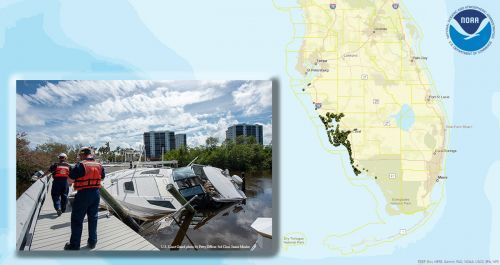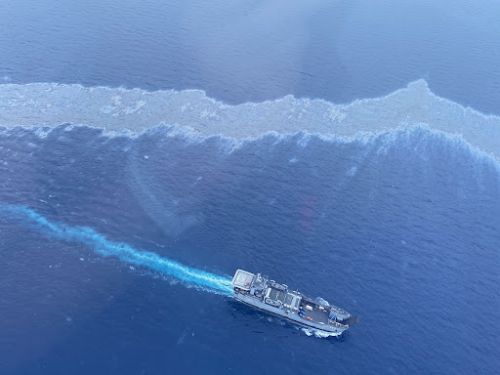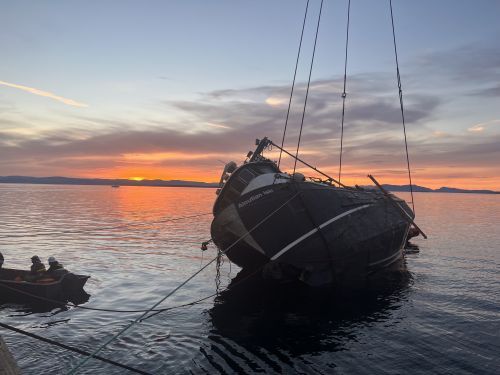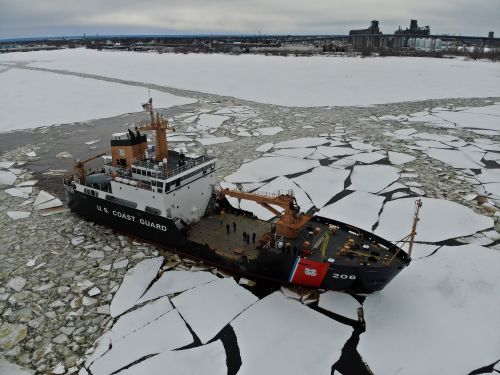Fiscal Year 2023: Providing Scientific Expertise for Oil and Chemical Spill Response
OR&R’s Emergency Response Division (ERD) supports the U.S. Coast Guard (USCG) by providing round-the-clock scientific expertise for oil and chemical spills in marine and coastal waters.
ERD’s efforts facilitate spill prevention, preparedness, response, and restoration through its network of regionally distributed scientific support coordinators; a Seattle-based support team of scientists, technical experts, and software developers; and federal, state, and academic partners.
Supporting Communities When Disasters Strike
This year, ERD responded to 130 incidents and provided support to mitigate or recover over 1.15 million gallons of spilled oil and chemicals. However, OR&R is also prepared to provide a broad range of scientific, technical, and policy experts to support the response and maximize recovery when a disaster is imminent or strikes unexpectedly. While the National Ocean Service has received Federal Emergency Management Agency (FEMA) Mission Assignments (MAs) in the past in response to these disasters, fiscal year (FY) 2023 marks the second year that ERD has directly received MAs and FEMA support, which totaled almost $440,000 in reimbursable funding.
FEMA issued MAs directly to ERD for the delivery of oil and chemical spill response expertise and services for incidents such as: Hurricane Ian, a Category 4 hurricane that produced catastrophic storm surge, damaging winds, and historic freshwater flooding across Florida in October 2022; the devastating wildfires that broke out on the Hawaiian island of Maui in early August 2023; and Hurricane Idalia, a powerful Category 4 hurricane that caused significant damage across parts of the southeastern U.S., especially in northern Florida, in late August 2023. ERD provided scientific support for the removal or mitigation of over 4,795 pollution sources and large debris from U.S. coasts and oceans, including 95 vessels in Maui alone, while ensuring the protection of our natural resources and wildlife.
Providing Scientific Support for International Partners
Through the U.S. State Department’s Assistance for International Oil Spills process, NOAA is often called upon as a key member of the U.S. National Response Team to provide scientific and technical support, resources, and counsel to other nations.
Over the past year, OR&R coordinated and directly provided scientific support to a number of nations that experienced marine oil, chemical, and or other environmental disasters. In collaboration with internal NOAA partners, OR&R provided response products or guidance to:
- the Philippines, following an oil spill that occurred after the tanker Princess Empress sank off the coast of Oriental Mindoro;
- the West African nation of Guinea, when fishermen observed a mysterious marine slick that caused chemical burns to skin;
- Canada, when M/T Mare Siculum reported an accidental discharge of fuel oil during a heavy storm off the coast of Newfoundland;
- and Guyana, when OR&R helped bolster the country’s disaster response capabilities by providing response training for a second year.
Critical Support for a Difficult Salvage
In the opening days of FY23, emergency responders celebrated the successful removal of the 58-foot Swinomish Tribal purse-seiner F/V Aleutian Isle, which had sank six weeks earlier just off the coast of San Juan Island in Washington State. The vessel went down, settling at a depth of 230 feet, with approximately 2,500 gallons of diesel fuel, 100 gallons of engine oil and hydraulic oil, and several sections of purse-seining nets that became dislodged from the vessel. The sinking occurred near a common transit route of the federally endangered Southern Resident Killer Whale, and a full-scale incident response was launched with local, state, federal, and international involvement.
ERD coordinated with various internal NOAA partners to provide a suite of unique products and technical and scientific guidance to the USCG regarding swift and unpredictable ocean currents, weather conditions, oil toxicity, endangered species, fishing net debris, and transboundary issues with Canadian partners—while navigating strong interest in the incident.
The complex response, which ultimately eliminated the vessel, purse seine net, and pollution threat to the environment, highlighted the coordination role of OR&R, as well as the resources within NOAA, that can rapidly act and produce a variety of critical products to advise responders and protect natural resources.
OR&R Science Advancing Freshwater Response and Assessment
In FY2023, OR&R partnered with the U.S. Coast Guard Great Lakes Center of Expertise (GLCOE) to advance science and operational capabilities for freshwater spill responses and assessments. Scientists from OR&R, the U.S. Coast Guard, the Coastal Response Research Center (CRRC), and partners developed and tested operational capabilities for using uncrewed aircraft systems (UAS) with various sensors to characterize oil on water and in ice environments in the Great Lakes. In order to characterize ice and oil-in-ice without introducing oil into the environment, the teams conducted shore-based controlled testing with oil and ice in totes at the GLCOE facility along the icy shores of the St. Mary’s River in daylight and darkness.
They also advanced UAS operational capabilities in freshwater and marine environments. Field trials were conducted during ice-breaking in the Lake Superior Harbor aboard the USCG Cutter Spar and again aboard the USCG Cutter Blackfin in natural oil seeps offshore Santa Barbara, CA. Teams from NOAA and USCG operated from response vessels to train and transition newly developed tools for oil and ice detection and mapping into operations. The teams tested methods for flying aerial drones for optimal data collection for mapping on-water conditions with oil and with ice, and for data upload and delivery via NOAA’s Emergency Management and Response Application (ERMA®). These studies bolster resilience to oil spills and advance NOAA’s oil spill response and assessment capabilities, including in freshwater and ice environments. Currently NOAA is conducting eight projects focusing on spill planning, detection, modeling, and mapping with funding from the GLCOE to enhance support for Great Lakes spills.
 An official website of the United States government.
An official website of the United States government. 



